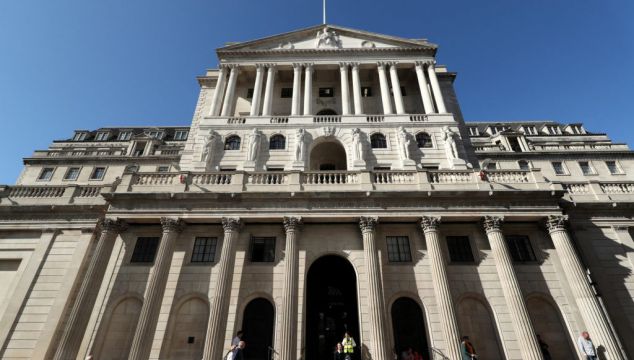The Bank of England again sought to stem a sharp sell-off in Britain's £2.1 trillion (€2.4 trillion) government bond markets on Tuesday, expanding its emergency buying to inflation-linked debt.
Citing a "material risk" to financial stability after pension firms were hit by the turmoil, the BoE split its programme to buy up to £10 billion of British gilts each day to include up to £5 billion of index-linked bonds.
This marked the BoE's fifth attempt to quell market turmoil in just over two weeks, including verbal interventions, and marked another embarrassment for UK Prime Minister Liz Truss whose economic agenda last month sent investors heading for the exit.
Inflation-linked gilts, typically held by pension funds and known in the market as linkers, suffered another significant sell-off on Monday as the end to the BoE's programme approached.
"The beginning of this week has seen a further significant repricing of UK government debt, particularly index-linked gilts," the BoE said in a statement.
"Dysfunction in this market, and the prospect of self-reinforcing 'fire sale' dynamics pose a material risk to UK financial stability."
A pensions industry group urged the BoE to extend its bond-buying support beyond its October 14th deadline, and possibly beyond the end of this month.
"A key concern of pension funds since the Bank of England's intervention has been that the period of purchasing should not be ended too soon," the Pensions and Lifetime Savings Association said.
Pension funds have scrambled to raise cash since finance minister Kwasi Kwarteng sparked a bond rout on Sept. 23 when he announced the government's plans for unfunded tax cuts.
The funds were forced to stump up emergency collateral in liability-driven investments (LDI), which use derivatives to hedge against shortfalls in pension pots, after British government bonds dropped sharply in value.
Many did so by selling gilts, sparking a vicious cycle of falling prices that forced the BoE to pledge to buy as much as £65 billion of long-dated government bonds between September 28th and October 14th.
"It's a big hole," a pension industry consultant said of the latest moves in markets.
Some long-dated inflation-linked gilts have lost more than 75 per cent of their value this year. While yields for most linkers fell modestly on Tuesday, the drop represented only a small dent in Monday's heavy sell-off.
At an auction earlier on Tuesday, Britain's Debt Management Office had to offer investors the highest return since 2008 to help sell £900 million of index-linked gilts due in 2051.
The results of BoE's first linker buy-back are due shortly after 1.45pm. It will not accept offers made by sellers at real yields below their level at Monday's close of business.
Life after death
Investors in British government debt are worried about what will happen to the market after most of the BoE's emergency support measures end.
"Eventually, the gilt sell-off could force the BoE back into the market," wrote Antoine Bouvet, strategist at ING, in a research note titled "the never ending gilt calamity".
The British central bank has postponed the start of its sales of gilts until Oct. 31 - a big step in the unwinding of its quantitative easing (QE) stimulus push over the past decade - in order to launch its ongoing emergency purchase programme.
"While the BoE intervenes in gilt and corporate bond markets, the policy of consistently acting at the last minute without putting a more credible long-term plan in place is unnerving for markets," Bouvet said.

The BoE also temporarily paused its sales of its corporate debt holdings, reflecting the widening trouble in British financial markets.
The IHS Markit iBoxx Sterling Corporate Bond Index fell on Monday to its lowest level since 2016.
Simeon Willis, chief investment officer of pension consultants XPS, said he had seen pension funds selling "across the board" to find liquidity.
"We have seen some property funds respond to that, we have seen credit spreads widen, we have seen equities fall - we have seen them coming out of all asset classes," he said. - Reuters







